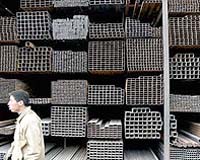| . |  |
. |
Sydney (AFP) Oct 24, 2010 Mining giant Rio Tinto said it was focused on a massive ramp-up of its Australian iron ore operations Sunday, following the "disappointing" collapse of a lucrative tie-up with rival BHP Billiton Rio chief Tom Albanese said both companies had done "everything we could" to get the regulatory approval necessary to merge their iron ore projects in the mineral-rich Pilbara region -- a deal they ultimately abandoned on Monday. "Once we heard from the regulators we both recognised this is just getting too hard so we unfortunately -- because I'm disappointed -- terminated that agreement this week," Albanese told ABC television. "And we're moving on -- we're moving on by expanding our operations in the Pilbara." Rio announced a 3.1 billion US dollar ramp-up of its Pilbara projects Wednesday, targeting production capacity of 283 million tonnes a year in 2013 and 333 million tonnes by 2015 from 220 million tonnes currently. "I think the single best thing that we could be doing for Rio Tinto shareholders is to get as many tonnes developed in the Pilbara (as possible) and that's exactly what we're doing," Albanese said. Rio was on track to expand its Pilbara business by more than 50 percent in the next five years, he added, a "massive change, massive project." The iron ore joint venture, estimated to deliver 10 billion US dollars in savings, was the second failed deal with BHP, which made a hostile 147 billion-US-dollar play for Rio that lapsed in 2008 due to the financial crisis. It also follows the Anglo-Australian giant's expensive and hugely unpopular takeover of Canada's Alcan and snubbing of a 19.5 billion US dollar cash injection from Chinalco in June 2009. Albanese insisted that the company was on track, dismissing suggestions it had been "three strikes" for Rio. "We have a very strong business -- let's just remember that we had record profits in the first half," he said. "Let's also remember that we had cash generation from our operations of nearly 10 billion dollars in the first half. All of our businesses are running very well." A compromise with the Australian government on its proposed "super tax" on mining profits which resulted in a narrowing of its scope and a reduction in the headline rate had paved the way for Rio to grow, he added. "That has allowed us to make more than six billion (dollars) in investments just in iron ore in Australia since July," Albanese said. Rampant demand for raw materials by China has buoyed Rio's business and Albanese said Beijing was grappling with a v-shaped recovery which had overheated certain aspects of its economy, with recent signs of inflation. "I do think that what China's trying to do is to find almost that 'Goldilocks' point where the economy's not too hot or not too cold," he said. "Keeping the GDP above what they've targeted at eight percent... would be probably the best situation for continued growth." Albanese was circumspect on calls from the US and others for China to adjust the value of its currency. "I think currency discussions are certainly going to be a matter of the G20," he said. "From my own perspective, I think it's something that should get worked out, and I would hope to see that that gets worked out."
Share This Article With Planet Earth
Related Links Global Trade News
 China's voracious commodities appetite moves markets
China's voracious commodities appetite moves marketsLondon (AFP) Oct 24, 2010 China, the world's second largest economy and its number one energy consumer, is shaking up global commodities markets where its potent growth momentum is also powering a rise in metals prices. "China is now the largest energy consumer by our definition," Nobuo Tanaka, head of the International Energy Agency, said recently. "Probably half of the oil demand increase comes from China. Chin ... read more |
|
| The content herein, unless otherwise known to be public domain, are Copyright 1995-2010 - SpaceDaily. AFP and UPI Wire Stories are copyright Agence France-Presse and United Press International. ESA Portal Reports are copyright European Space Agency. All NASA sourced material is public domain. Additional copyrights may apply in whole or part to other bona fide parties. Advertising does not imply endorsement,agreement or approval of any opinions, statements or information provided by SpaceDaily on any Web page published or hosted by SpaceDaily. Privacy Statement |